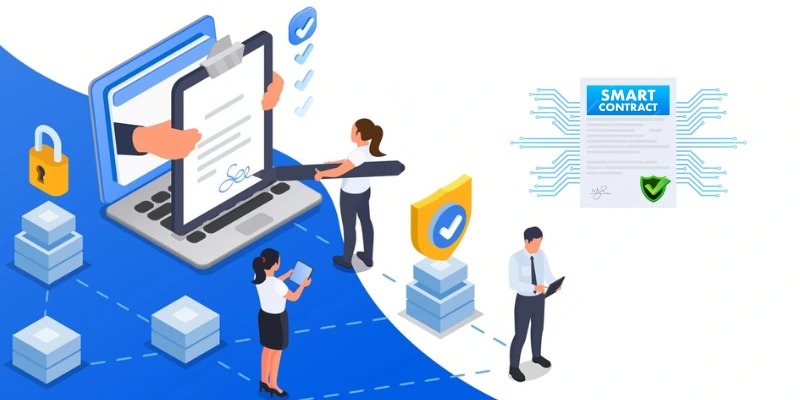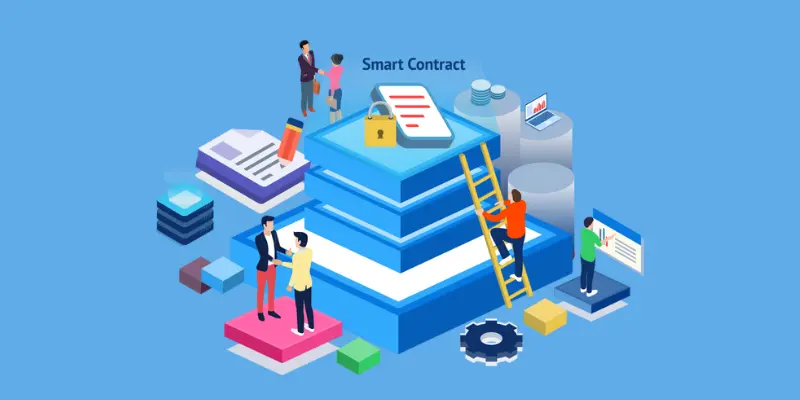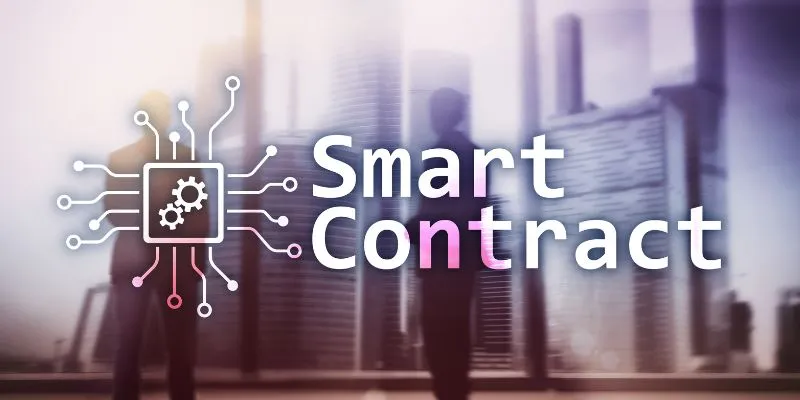Smart contract planning may need to be clarified. So what exactly are they, and what can they do for us? Until recently, smart contracts were only seen on the Ethereum network (rather than Bitcoin's blockchain). However, recent news of Bitcoin having smart contracts as an official feature may pique your curiosity even further.
Imagine a world in which contracts run themselves, and trust is built and maintained through untameable security code lines - this is the world of smart contracts - blockchain-based computer programs or transaction protocols that function as digital contracts. So what exactly are smart contracts, how do they work, and how can they be utilized?
What Is a Smart Contract?
A smart contract is an automated program that automates steps required by contracts or agreements. Once completed, these transactions can be traced and irrevocable - think of a computerized vending machine when envisioning this concept; when you insert money and press an item button, the software that controls this machine (the smart contract) triggers delivery of what was selected by you!
Smart Contract Development Services enable trustworthy transactions and agreements to be executed between various parties without needing central authority, legal system, or external enforcement mechanisms.
Blockchain technology has come to be recognized primarily as the foundation for Bitcoin; however, its impact extends much further.
How Do Smart Contracts Work?
Like any other contract, a smart contract can be described as an obligation-based contract that two individuals sign. It uses codes to benefit from blockchain technology's advantages, allowing for greater efficiency, security, transparency, and efficiency. Smart Contract Planning is executed and managed with simple "if/when...then ..." statements written in codes on the blockchain.
These are the necessary steps for the proper functioning of smart contracts.
- Agreement: All parties wanting to conduct business or exchange goods or services must agree with the agreement's rules and regulations. Additionally, they need to decide how smart contracts function and the criteria that must be met for that agreement to be in place.
- Contract creation participants in a transaction could make a smart contract differently, like creating it by themselves or working with Smart contract developers. The terms of the contract are written in a programming language. In this phase, checking the security of the contract thoroughly is crucial.
- The Deployment Process: Once the contract is finalized and published, it will be posted on the blockchain. Smart contracts are uploaded to the blockchain in the same manner as regular crypto transactions using the code inserted into the field for data used to exchange. After verifying the transaction, it's declared active on the blockchain and can't be modified or reversed.
- Monitoring Conditions: The Smart Contract Development Company analyzes the blockchain or some other reliable source to determine predetermined conditions or prompts. The triggers could be almost anything digitally verified, for example, a date that has been reached or a transaction made.
- Execution: Once all trigger criteria are satisfied, the "if/when...then ..." statement will activate the smart contract. It could perform one or a few actions, such as transferring money to a vendor or registering the possession or ownership.
- Recording: Results of the execution of contracts are published promptly in the blockchain. The blockchain system validates the actions performed, records the execution as an exchange, and stores the contract signed to the system's blockchain. The agreement is available anytime.
Types of Smart Contracts
Smart Contract Development Services are divided into different kinds according to their function and use. There are four types of smart contracts.
Payment Contracts: These Smart Contract Development Company transfer funds between two parties under predefined terms. These contracts can automate payments, ensuring that money is released only if certain conditions are met. For instance, a payment contract could be created to let a seller release funds when buyers have received items or services.
Escrow Contracts: Escrow contracts act as transaction intermediaries and hold funds or assets until conditions are met. They offer additional protection and confidence when conducting peer-to-peer transactions. They ensure that both parties comply with their obligations before funds or assets are released.
Governance Contracts: These Smart Contract Development Services allow the decentralization of decision-making within an organization or blockchain network. They permit token holders to cast votes on proposed changes or proposals to the rules of the network to ensure transparency and democratic governance.
Multi-Signature Contracts: Multi-signature agreements require several parties to sign their signatures or consent before a transaction is executed. They add a layer of security. They can be employed when consensus or agreement between multiple parties is needed.
Top 10 Uses of Smart Contracts
The applications of smart contracts are myriad and wide-ranging and are used in a variety of industries.
Royalty Payment in Media and Entertainment
As they begin their careers, new artists depend on the revenue from stream services. Smart contract software can help facilitate more efficient payment of royalties. They can also outline, for example, the percentage of royalties due to the record label and the artist. Quick and easy handling of these payments dramatically benefits everyone involved.
Smart Contract Development Services can also help solve the problem of distribution of royalties for an over-the-top (OTT) content environment where traditional agreements for network distribution do not have any effect. This technology can allow emerging performers and less well-known actors to receive regular but small payments.
Decentralized Finance (DeFi) Applications
Utilizing smart contracts and cryptocurrencies, DeFi apps can provide financial services without intermediaries. DeFi's services are no longer limited to peer-to-peer transactions. With DeFi, smart contracts allow complicated processes such as borrowing and lending or derivative transactions.
Conversion of Assets to NFTs (NFTs)
In assigning ownership and governing the ability of digital assets to be moved, Smart Contract Planning have enabled the making of non-fungible currency (NFTs). These contracts can also be altered to include additional clauses, such as royalties and access rights to software or platforms. In essence, Smart contract developers enable your digital assets to be considered like physical ones but with the actual value of tangible assets.
B2B Data Marketplaces
Data marketplaces are online platforms that allow users to buy and sell various data streams or datasets from multiple sources. Smart contract developers enable the development of fast-growing, dynamic marketplaces that can facilitate the use of automated and secure transactions without the need for human intervention. Dataspace is an excellent illustration of this specific smart contract usage case.
Supply Chain Management
Smart Contract Development Services can operate autonomously without mediators or other third parties since they're self-executing. A company can design smart contracts for the whole supply chain. Regular monitoring or auditing is not required. Any deliveries received that are not in line with the time frame could trigger steps to ensure seamless execution.
Digital Identity Cards
Users can save reputational information and digital assets on smart contracts in order to create digital ID cards. If smart contracts are connected to various online services, outside parties can gain information about individuals without divulging their actual identities.
For example, these contracts include credit scores that lenders may use to confirm the applicants for loans without the threat of discrimination based on demographics or other factors. Additionally, candidates can share resumes without fear of gender discrimination when hiring.
Electoral Polls
Voting can occur in an encrypted environment created by smart contracts, reducing the chance of manipulating voters. Because of the encryption, each vote is ledger-protected and challenging to interpret. Furthermore, smart contracts could increase voter participation. By using an electronic voting platform powered by smart contracts, voters can avoid going to a polling place.
Real Estate
Smart contracts could speed up the transfer of property ownership. Contracts can be developed autonomously and then executed. Following the buyer's payment to the seller, for example, the smart contract could immediately give control to the asset based on the blockchain's transaction record.
Healthcare Data Management
Smart contracts could transform health by making data recording more accessible and practical. They could, for instance, promote clinical trials by ensuring the integrity of data. Hospitals can keep accurate records of patient information and efficiently schedule appointments.
Civil Law
Smart contracts also have a place in the legal sector. It is a way to make legally binding social and business contracts. In some areas within North America, governments have granted smart contracts to digitize agreements. For instance, California can issue marital and birth certificates in smart contracts.
Benefits and Challenges of Smart Contracts
.webp)
As with all technologies, Smart Contract Development Services come with both pros and cons. Here are the advantages of smart contracts:
Benefits of Smart Contracts
The main reasons for using smart contracts are:
- One source of truth
The same information is available to individuals every day. This reduces the risk of exploitation of a contract clause. This improves security and trust because the contract information is accessible for the contract term. In addition, transactions are replicated to ensure that all parties involved are provided with copies.
- Reduced human effort
Smart contracts don't require third-party verification or oversight by a human. The participants have independence and autonomy, especially when it comes to DAO. This inherent characteristic of smart contracts can bring additional advantages, such as efficiency and cost reductions.
- Preventing errors
A vital requirement of every contract is to ensure that each phrase and condition is documented in full detail. A lapse in this detail could lead to severe problems, such as excessive penalties and legal complications. Smart contracts that are automated avoid making mistakes. This is among its most significant benefits.
- Zero-trust as a default
The whole structure for Smart Contract Planning is an improvement above conventional methods. It means there's no need to depend on the trustworthiness of any other parties during a transaction. An exchange or transaction does not require faith as a primary element based on zero-trust security requirements. Because smart contracts are based on a decentralized network, each aspect is transparent, fair, and just without the risk of privilege creep.
- Built-in backup
These contracts capture essential transactional details. So, when your information is utilized in contracts, it's saved indefinitely for future use. In the event of data loss, it is simple to recover these characteristics.
Challenges of Smart Contracts
Here are the possible negatives of smart contracts, as well as issues worth focusing on:
- Inconsistent support and rigidity
Modifying the protocols of smart contracts is complex, and repairing code mistakes can be expensive and time-consuming. Even if Smart Contract Development Company can conform to laws in various countries, ensuring they're abided by worldwide can be challenging.
- The difficulty in capturing data that is not quantifiable
For companies with measurable information, such as finance or agriculture, it's relatively easy to create smart contracts. However, many industries do not have quantifiable metrics. This is the case for situations where creative work needs to be assessed.
- Conflict with GDPR
The General Data Protection Regulation (GDPR) grants citizens the right to have their data erased and gives them more control over it. They may request that all their data be erased. If, however, the person has signed a digital legal contract, it cannot be deleted or altered.
- Skills shortage
The Smart Contract Development Services require an understanding of software engineering. Innovative Smart Contract Development Company differs from conventional software development because it requires programmers who have organizational skills and a knowledge of programming languages that are not traditional, like Solidity. These abilities are difficult to find.
- Scalability Issues
Then there's the issue of scale and size. Visa currently processes around two thousand transactions every second. According to the World Coins 2023 update, Ethereum, the world's largest blockchain for smart contracts, can handle only 30 transactions per second.
Top Smart Contract Tools
The most popular tools designed to help smart contract developers include:
BoringSolidity
BoringSolidity is a set of libraries that can be used to build Solidity smart contracts. They aim to standardize and streamline routine tasks, eliminate imperfections, and increase the overall quality of code.
Chainlink
Oracles that use blockchain combine real-world data from different sources and then transfer it to smart contracts through the blockchain. Chainlink is one of the famous Oracle solutions that is available at present. It offers secure and safe data that can be used to support smart contracts across multiple blockchains.
Ethcode
Ethcode serves as a Visual Studio Code extension for creating Ethereum smart contracts. It offers a user-friendly development environment that allows texts, troubleshooting, and unit testing contracts. The code is open-source and accessible for Microsoft users to utilize.
Octopus
Octopus can be described as a program that allows you to thoroughly evaluate the source code for intelligent contracts. It has features for evaluating code, including symbolic execution and call flow analysis, as well as control flow analysis. This lets you identify and fix contract mistakes earlier than it's already too late.
OpenZeppelin
OpenZeppelin has become one of the most well-known software tools used to create smart contracts. The open-source framework provides an easy-to-integrate library of secure and community-reviewed intelligent contracts. It also offers audit and authentication options for smart contracts.
Solidity
Solidity is the language used to build smart contracts on the Ethereum blockchain. User interfaces include imirrors Python, C++, and JavaScript. Since they are compatible with Ethereum Virtual Machine (EVM), Solidity applications can be run on other blockchains, such as Polygon or Avalanche.
Future of Smart Contracts
Smart Contract Planning is complex, and its capabilities go beyond simple asset transfers. They can execute transactions in various areas, from legal procedures to crowdfunding agreements, insurance premiums, and financial derivatives. Smart contracts can decentralize the economic and legal fields by automating repetitive and routine processes that cost attorneys and banks enormously.
Even though Ethereum is the most favored Blockchain platform for Smart Contracts, Rivals such as Cardano are emerging as new environments for Smart contract developers to develop innovative and secure applications. Incorporating AI (AI) has also gained momentum as a revolutionary advancement to smart contracts. AI algorithms can analyze the data and perform actions per predefined rules embedded within smart contracts. The mixture of AI and smart contracts will provide automation and intelligent systems that can adjust and react to events that occur in real-time.
The role of lawyers may also change soon as intelligent contracts acquire features such as adjudication of traditional legal contracts and customizable template templates for smart contracts. Furthermore, Smart Contract Development Services capability to automate procedures, regulate behavior, and perform real-time audits and risk assessments can benefit compliance.
Smart contracts also promise to automate the processes that run with IoT or edge devices. For instance, an energy company could provide a service where smart contracts operate when there is a change in power prices in coordination with the devices built into power meters. For instance, if prices surpass a certain level, a smart contract can automatically shut off or reduce the power consumption of appliances like air conditioners with a specifically monitored IoT controller.
Another possible use case is integrating the smart contract into vending machines, which release products due to cryptocurrency transactions.
Suppose you are in a supply chain situation. In that case, smart contracts may unlock funds when the cargo container is at its destination, and IoT sensors reveal it is unopened. The contents were maintained at a suitable temperature and humidity and did not move to the destination.
Conclusion
If you've read this entire blog, you know that Smart Contract Development Services come with advantages and drawbacks. Sure, they are solvable with improvements in the field of blockchain technology. Ethereum 2.0 will tackle the issue of scaling and transaction fees. It is expected to be released in the middle of 2022.
You can also create a Smart contract using AI. One option is to allow AI to examine prior intelligent agreements between the different parties. This means that the AI will suggest possible clauses to improve the terms of the contract. AI is also vital for transferring information from IoT devices like cameras and sensors. This provides the contract with the most accurate data for making decisions.
Another possibility is that many people could lose their jobs. Jobs such as lawyers, manual clerical work, and even middlemen might lose their income source. However, as technology advances in blockchain technology and products such as DAO and intelligent contracts, numerous courses for Smart contract developers, doctors, doctors, and lawyers are being taught about the opportunities smart contracts could bring in the near future.





.webp)







Share this blog